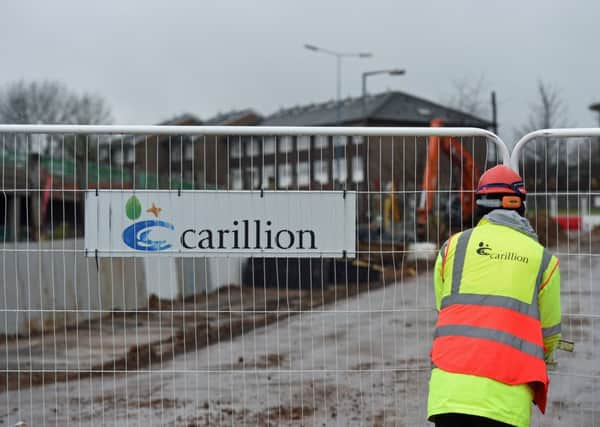Bill Jamieson: Action on audit failures vital before they splash the cash


The election campaign has brought promises from the major parties of major uplift in government infrastructure spending. But there has been little critical analysis of why so many public projects have gone badly wrong – from massive cost overshoots through completion delays to productivity benefits falling well short of mooted returns.
This problem of reliable accounting is by no means confined to the public sector. In recent years we have seen the sudden and spectacular collapse of major companies that were thought to be resilient brought down by trading irregularities and/or hitherto unquestioned levels of debt.
Advertisement
Hide AdAdvertisement
Hide AdThe most spectacular example was construction giant Carillion, which went into compulsory liquidation in January last year with liabilities of almost £7 billion.
The group, with 43,000 employees and whose shares were widely held by pension funds and investment companies, was involved in a host of major government projects including HS2. As such, its activities ought to have attracted greater critical scrutiny. It relied on large contracts that proved less lucrative than expected and was forced to slash the value of these by £845 million. It needed a £300m cash injection, but the banks refused to put more in.
A Parliamentary inquiry report by the Business and the Work and Pensions Select Committees in May 2018 said Carillion’s collapse was “a story of recklessness, hubris and greed, its business model was a relentless dash for cash”.
Household name company failures have continued into this year. Patisserie Valerie, a high-profile chain of French-themed cafés, went into administration in January, with 900 staff losses. The group had been worth £450m before evidence of large-scale fraud of up to £40m and unauthorised loans of £9.1m were discovered. A share issue of £15m and an additional £20m from the company’s founder were insufficient to save the business.
Debt laden travel agent and airline company Thomas Cook collapsed into liquidation in September, leaving the government to provide emergency flights for tens of thousands of stranded holidaymakers.
Given this background, party leaders have proceeded like estate agents at a house visit reciting a hard promotional sell to would-be buyers – to the accompaniment of masonry crashing to the ground.
Troubled trucking firm Eddie Stobart last month it revealed a £2m error in its 2018 results and warned it expected to report a loss of at least £12m for the first half of the year. Its shares have been suspended and the chief executive is to stand down.
Last week shares in advertising agency M&C Saatchi lost nearly half their value on news of a major profit warning and a forensic review of its accounts that revealed profit over-statements reckoned at £11.6m over the past five years. The company’s stock market value has tumbled from £320m in early August to less than £74m.
Advertisement
Hide AdAdvertisement
Hide AdCraig Donaldson, chief executive of troubled Metro Bank, announced last week he will be leaving at the end of the month, following founder Vernon Hill out of the door. The departures follow a major accounting error uncovered by Bank of England regulators relating to miscalculations on the riskiness of a string of property loans. The news at the time sent Metro Bank shares crashing by almost 90 per cent.
As if all this was not enough, fashion retailer Ted Baker was at the centre of an accounting scandal last week after the company discovered that the inventory valuation on its balance sheet had been overstated by between £20m and £23m.
The mis-statement follows three profit warnings this year and the resignation of chief executive Ray Kelvin in March. Shares in the international grouphave fallen by 77 per cent over the past year.
Investors and the public have good cause to be troubled by the proliferation of such mis-statements, errors and lapses. Pension funds and the savings of millions rest on the accuracy of company annual reports. But searching questions are now being asked of the auditing profession, with government and regulators under pressure to act.
Earlier this year, Andrew Tyrie, chairman of the Competition and Markets Authority (CMA), warned that “addressing the deep-seated problems in the audit market is now long overdue”, pledging his organisation “will persist until the problems are addressed”. Meanwhile the Financial Reporting Council has said the organisation needs to be replaced with a body capable of commanding respect and fear among auditors.
Action is promised by the government. This may not seem among the most burning issues on the election campaign. But the latest spate of errors and mis-statements merits urgent and effective changes – both in the private and public sectors.
Business rates queries grow
Kate Forbes MSP, Minister for Public Finance and Digital Economy, is the latest to query the implications of devolving further powers to local authorities by way of an amendment tabled by Green MSP Andy Wightman.
Her letter last week to James Dornan, convener of Holyrood’s Local Government and Communities Committee highlights “some of the direct, and possibly unintended, consequences of this amendment and a number of potential risks”. For example, in 2018-19, 23 councils benefited from Scottish Government funding protection.
Advertisement
Hide AdAdvertisement
Hide AdSince the last revaluation, the City of Edinburgh, Aberdeen City and Highland councils have benefited to the tune of £27.6m, £28m and £6.8m respectively. Uncertainty surrounds the impact on the formula for distributing funding to local authorities through the local government finance settlement.
Another direct consequence of the amendment, she adds, “would have the effect of removing the Scottish Government’s ability to provide national reliefs and on commencement would immediately abolish widely regarded and high-profile reliefs such as the Small Business Bonus Scheme, Business Growth Accelerator and Nursery relief”.
The reliefs abolished as a result of the amendment have a combined value equivalent to around £307m. I do hope others at Holyrood are paying keen attention.